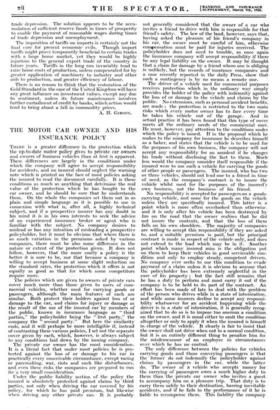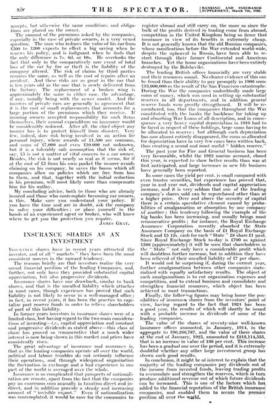THE MOTOR CAR OWNER AND HIS INSURANCE POLICY
THERE is a greater difference in the protection which the up-to-date motor policy gives to private car owners and owners of business vehicles than at first is apparent. These differences are largely in the conditions under which the company will agree to accept responsibility for accidents, and no insured should neglect the warning note which is printed on the face of most policies asking the insured to read the document carefully. It is these conditions as much as anything that determine the real value of the protection which he has bought to the car owner, and he should be sure that he understands them. On the whole the companies set them out in as plain and simple language as it is possible to use in connexion with what is, after all, a highly technical subject, and if a prospective insurer has any doubt in his mind it is in his own interests to seek the advice of an experienced insurance broker or agent who is familiar with the subject. No company desires to mislead or has any intention of misleading a prospective policyholder, but it must be obvious that where there is so much variation in the premiums asked by various companies, there must be also some difference in the nature or extent of the protection given. It does not follow, however, that the more costly a policy is the better it is sure to be, nor that because a company is willing to accept business at some slight reduction on the standard rates, the protection which it offers is not equally as good as that for which some competitors require more.
The policies which are given to owners of private cars cover much more than those given to users of com- mercial vehicles, whether used for carrying goods or passengers, although the main features of each are similar. Both protect their holders against loss of or damage to the car, and claims for injury or damage as the result of the use of the insured car by members of the public, known in insurance language as " third parties," the policyholder being the " first party," the company the second party." But here the similarity ends, and it will perhaps be more -intelligible if, instead of contrasting these various policies, I set out the separate cover given by each, which, however, is always subject to any conditions laid down by the issuing company. The private car owner has the most consideration. It is a literal fact that under most policies he is pro- tected against the loss of or damage to his car in practically every conceivable circumstance, except racing or pacemaking, war, riots and such like disturbances, and even these risks the companies are prepared to run for a very small consideration.
Under the public liability section of the policy the insured is absolutely protected against claims by third parties, not only when driving the car covered by his policy, for which he has paid premium, but likewise when driving any other private car. It is probably. . not generally considered that the owner of a car who invites a friend to drive with him is responsible for that friend's safety. The law of the land, however, says that, having asked the pleasure of his friend's company in his car, the owner must be careful of him, otherwise compensation must be paid for injuries- received. The policyholder does not need to trouble, as once again the insurance company will accept responsibility if there be any legal liability on the owner. It may be thought that a claim for damage by a friend whom one is obliging is unlikely, but the records of insurance companies and a case recently reported in the daily Press, show that such a contingency is by no means a remote one. The driver of a vehicle used kir commercial purposes receives protection which in the ordinary way simply provides the holder of the policy with indemnity against the loss of or damage to the vehicle and claims by the public. No extensions, such as personal accident benefits, are made ; the protection is restricted to the two main risks which every motor owner has to face every time he takes his vehicle out of the garage. And in actual practice it has been found that this type of cover meets all the ordinary needs of the commercial user. He must, however, pay attention to the conditions under which the policy is issued. If in the proposal which he makes to the company for insurance he describes himself as a baker, and states that the vehicle is to be used for the purposes of his own business, the company will not accept any responsibility for an accident if he changes his trade without disclosing the fact to them. Much less would the company consider itself responsible if the insured were to use such a vehicle for carrying the goods of other people or passengers. The insured, who has two or three vehicles, should not lend one to a friend in time of need, as the company's contract is to insure the vehicle whilst used for the purposes of the insured's own business, not the business of his friend.
No responsibility is accepted for passengers on a goods- carrying vehicle, and none for the goods on the vehicle unless they are specifically insured. This latter is a point which is more often overlooked than otherwise, and it is only after his vehicle has been destroyed by fire on the road that the owner realizes that he did not insure the contents, and that the loss of them falls on his own shoulders. The majority of companies are willing to accept this responsibility if they are asked to, and a suitable premium is paid, but the principal contract is made in respect of the vehicle only, and does not extend to the load whiCh May be in it. Another point which many insured miss is the obligation put on them to keep their vehicles in good serviceable con- dition and only to employ steady, competent drivers. No company ever seeks to use this condition to evade payment of a claim unless it is obvious to anyone that the policyholder has been extremely neglectful in the care of his property ; but the fact still remains that he has a duty to perform and must carry it out if the company is to be held to its part of the contract. An effort has been made of late to deal with the problem of the person who drives while in a state of intoxication, and while some insurers decline to accept any responsi- bility- whatsoever for an accident happening while the driver is in a state of intoxication, it is generally recog- nized that to do so is to impose too onerous a condition on the owner, and it is usual either to omit the condition altogether or only to apply it when the insured is himself in charge of the vehicle. It clearly is fair to insist that the owner shall not drive when not in a normal condition, but it is an entirely different thing to penalize him for the misdemeanour of an employee in circumstances over which he has no control.
The only difference between the policies for vehicle's carrying goods and those conveying passengers is that the former do not indemnify the policyholder against claims by passengers in the car, while the latter do. "The owner 'of a vehicle who accepts' money for the carrying of passengers owes a much higher duty to them than the private car owner who invites a guest to accompany him on a pleasure trip. That duty is to carry them safely to their destination, barring inevitable Accidents, and if he fails in the performance of it he is liable to recompense them. This liability the company accepts, but otherwise the same conditions and obliga-- - tions arc placed on the owner. The amount of the premiums asked by the companies, especially in the case of private owners, is a very vexed question. The man who reduces the value of his car from £500 to £200 expects to effect a big saving when he. renews his policy, and is indignant when he finds that the only difference is 7s. 6d. or 10s. He overlooks the fact that only in the comparatively rare event of total loss of the car by fire or theft is the liability of-the company altered. The risk of claims by third parties remains the same, as well as the cost of repairs after an accident. And these risks are as great in the car that is ten years old as the -one that is newly delivered from the factory. The replacement of a broken wing is approximately the sanie in either case, the advantage, if any, usually being with the newer model. And the insurers of private cars are generally in agreement that it is the cost of small replacements that accounts for a large portion of the premiums which they receive. if insuring owners accepted responsibility for such items themselves, their annual expenditure on insurance would be considerably reduced. After all, the chief object any insurer has is to protect himself from disaster. Very few, indeed, dare risk being involved in an action for personal injury, where awards of £1,500 are common, and sums of £7,000 and even £10,000 not unknown, but it is a tolerably safe assumption that the risk of, say, £5 is not a matter of vital concern to a car owner. Besides, the risk is not nearly so real as it seems, for if at the cost of £5 from his own pocket the insurer avoids claiming on his company, he .saves the bonus which all companies allow on policies which are free from loss to them, and that, together with the initial reduction in his premium, will most likely more than compensate him for his outlay.
My concluding advice, both to those who are already insured and those who contemplate becoming car owners, is this. Make sure you understand your policy. If you have the time and are in doubt, ask the company to solve your difficulties ; or place yourself in the hands of an experienced agent- or broker; who will know where to get you the protection you require.
JAMES GRAY.



























































 Previous page
Previous page